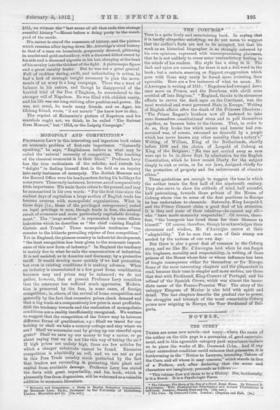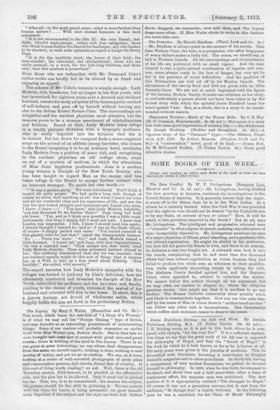THERE are some new novels—not many—where the name of the
author on the title page is a guarantee of good entertain- ment, and in this agreeable category past experienossinclines us to place the works of Mr. Desmond Coke. And if any other antecedent condition could enhance that guarantee, it is forthcoming in the "Notice to Lawyers, intending. Takers of the Cure, and all whom it may concern," which stands in lieu of a Preface, and, after declaring' that the scene and characters are imaginary, proceeds as follows :—
" This volume does not claim to be a History. Nor, incidentally, is it a Novel. It is a l'sycholegio Farce.
• Thel Coburg, r The Story of the Rise of a Groat Royal House. ly Edmund D. d'Anvoripao. With Photogravure Frontispiece and sixteen Illustrations iv halt-tone. London: Stanley Paul and Co. [les. not.] 1- The Cure. By Desmond Coke. London ; Chapman and Hall. 168.]
"After all—in the most genial sense—what is more farcical than human nature ? P. . . With such eternal humours is this book concerned.
" It is not recommended to the Idle Ill : the -very literal ; fad- dists; blissful malcontents ; critics with iron categories ; those who think human foibles Too Sacred for burlesque; any who hanker to be shocked; or such rude optimists as expect A Laugh On Every Page.
" It is for the healthily tired ; the lovers of their kind ; the sane-minded ; the observant; the old-fashioned ; those who are easily amused ; in a word, for the Life-long Children, and them only ; that this mixture is proscribed."
Even those who are unfamiliar with Mr. Desmond Coke's earlier works can hardly fail to be allured by so frank and engaging an appeal.
The scheme of Mr. Coke's romance is simple enough. Lady Medwin, rich, handsome, but no longer in her first youth, who has tyrannized for eighteen years over a devoted and obedient husband, resents his tardy adoption of the homoeopathic method of self-defence, and goes off by herself without leaving any clue to the Belton Hostel Nature Cure. The surroundings are delightful and the resident physician most attentive, but the inmates prove to be a strange assortment of valetudinarians and faddists. Bored at first, Lady Medwin takes refuge in a wholly platonic flirtation with a dyspeptic professor, who is easily beguiled into the delusion that she is in earnest. But her desire for conquest finds a more congenial scope on the arrival of an athletic young barrister, who comes to the Hostel imagining it to be an ordinary hotel, extricates Lady Medwin from a position of some risk, and, recognizing in the resident physician an old college chum, stays on out of a mixture of motives, in which the attractions of Miss Joan Appleton predominate. Joan is a modern young woman, a disciple of the New Truth Society, who has been taught to regard Man as the enemy, and has taken refuge in the Hostel to escape further contact with an innocent stranger. To quote her own words :— " It was a garden-party. We were introduced. Don't think it wasn't all quite proper. We had quite a long talk, though of course we never said anything at all : but when I heard his voice and all his wonderful ideas and his experience of life, and saw the way his eyes looked straight and humorous and honest into mine, I knew-1 knew—' You know,' said Lady Medwin helpfully, you bad Reverted To An Earlier State ?' Joan hung her head yet lower. Yes, and so I think now possibly I was a little weak, unwomanly : but then I simply felt I must not wait. I knew that London was impossible. I felt, I knew I should meet him again ; I almost thought I wanted to : and so—I was at the Slade school, of course—I simply packed and came." You buried yourself in this ghastly hole for just that ? ' asked the disappointed listener. No. . . . There was more.' Ah ? ' and Lady Medwin leaned a little forward. 'I found out,' said Joan, with slow impressiveness, he was a married man.' 'They always are, dear child,' cried Lady Medwin cheerily. Then some primmval instinct stirred in her. She suddenly remembered that she too was married: that her husband equally might do this sort of thing : that it became her, as A Wife, to take up a firm stand about Fidelity. 'How horrible l' she added, with severity."
The sequel narrates how Lady Medwin's sympathy with the refugee was turned to jealousy by Alan's defection; how she alternately comforted and thwarted the disciple of the New Truth, embroiled the professor and the barrister, and, finally, yielding to the claims of youth, welcomed the arrival of her husband and returned with him to her home. In short, this is a joyous fantasy, not devoid of wholesome satire, which happily fulfils the aim set forth in the preliminary Notice.











































 Previous page
Previous page